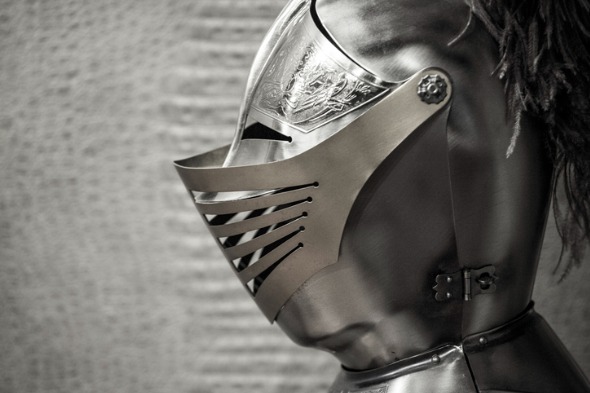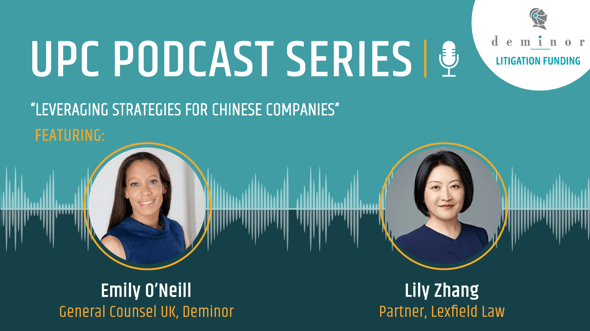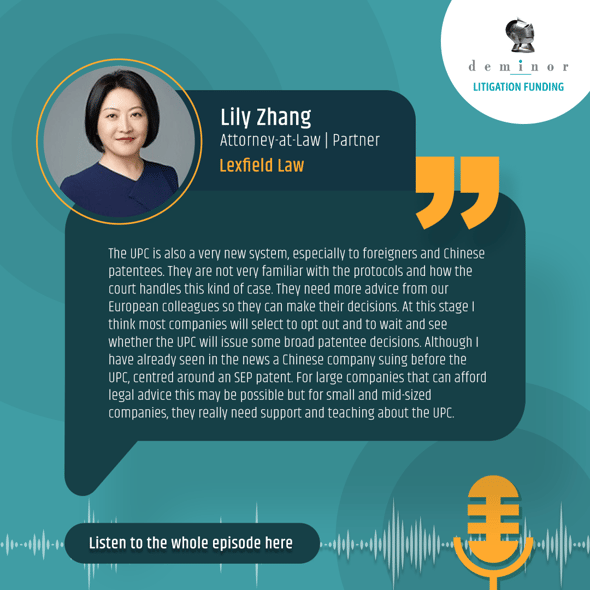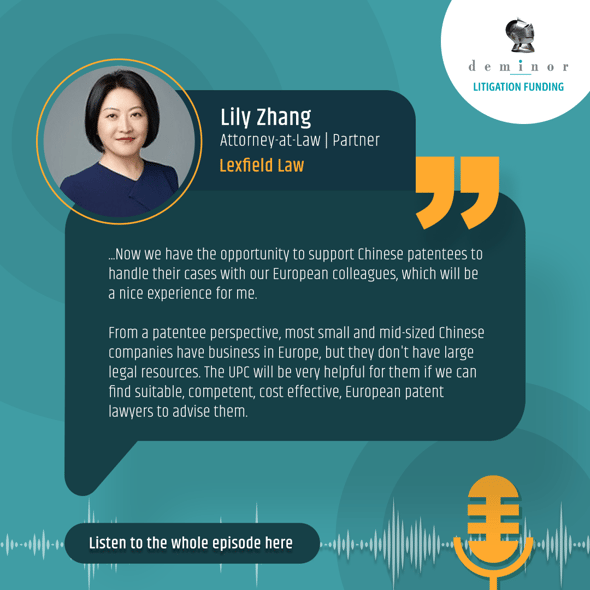In this podcast series, Emily O'Neill General Counsel UK and Global Intellectual Property lead for Deminor Litigation Funding, undertakes interviews with global professionals to understand the implications of the new Unified Patent Court (UPC).
Deminor welcomes you to join this conversation as we summarise the key elements of the conversations between Emily O'Neill and these experts, as captured in the podcast transcripts below.
Please click here for the Mandarin translation of this interview.
What is the UPC?
The Unified Patent Court (UPC) is a new European court system designed to harmonise and simplify the patent dispute landscape in Europe.
The UPC was established in order to provide a unified patent enforcement system with jurisdiction over ratifying EU member states. Countries that are Member States of the European Patent Convention (EPC) but are not EU member states cannot join the Unitary Patent or Unified Patent Court. As a unified court with a multi-state jurisdiction, the UPC hopes to be faster, more efficient and more cost-effective in resolving patent disputes.
The UPC's structure is made up of a Court of First Instance that is divided into central, local and regional divisions. Its central divisions are located in Paris and Munich. The third seat of the central division was originally assigned to London. The Italian Foreign Office published a press release that an agreement has been reached with France and Germany to set up a branch of the Central Division in Milan. This agreement now needs to be approved by the other UPC contracting states during the next meeting of the Administrative Committee in June 2023. The press release states that the Milan court is in the process of being set up and will be operational within the next year. In the interim, the Presidium of the UPC decided, that initially, the Paris and Munich central division seats will share this caseload. Cases concerning human necessities are assigned to Paris, and those involving chemistry and metallurgy to Munich for now.
The UPC’s Sunrise period launched on March 1st and allowed patentees to opt out of the exclusive jurisdiction of the new system to take effect from the court coming online on 1 June. Approximately 460,000 European patents and patent applications have been opted-out during Sunrise. Opt-outs are still possible now and at least during the 7-year transition period, unless proceedings are pending in the UPC, and will take effect once filed.
However, this is a new and untested forum, located in civil law jurisdictions but with elements of common law such as disclosure, cross-examination and adverse party costs. Notable jurisdictions such as the UK and Spain are not within the UPC - How will companies mitigate their commercial litigation risks in this environment?
Podcast Preface:
Deminor General Counsel UK, Emily O'Neill (EON), speaks with Lily Zhang (LZ), Partner, Lexfield Law, who is a qualified patent attorney and has extensive experience in counselling multi-national and domestic clients in intellectual property protection and enforcement of IP rights.
In this interview with Emily O’Neill, Lily provides valuable insights into how Chinese companies are likely to engage with the Unified Patent Court (UPC).
Podcast Transcript:
EON – Is the UPC an interesting venue for Chinese companies who need to enforce patents abroad?
LZ - Yes, definitely. I think the same calculus for choosing the UPC applies to Chinese patentees as for other multinational companies, such as efficiency of enforcement covering a very wide region with a big population, and strong remedies including injunctions. On top of that, the UPC will be particularly interesting for Chinese companies in certain industries, including computer science, microchips and the telecommunications sector. It is already seen as a go-to jurisdiction for Chinese patentees to expand their trading and business in Europe.
EON – Do you expect Chinese companies to use the UPC to revoke other party’s patents?
LZ - In the computer science and telecommunications sectors, Chinese companies will use the revocation procedures of the UPC as leverage in licence agreement negotiations. In other sectors, such as pharmaceuticals, most of the patents are owned by the big pharmaceutical companies. In my experience, Chinese companies are mostly generic so the UPC is a good jurisdiction for them to challenge the validity of pharmaceutical company patents where those remain in the UPC system.EON – Yes, a lot of pharmaceutical companies have opted out their patents, so we might have to wait until the transition period is over before we see a significant number of generics being able to use the UPC for invalidity.
How have Chinese companies approached opt-outs? Are they waiting to see what happens, or have they left their patents in the system with the potential to enforce?
LZ - Most Chinese patentees are very conservative. They will choose to opt-out from the UPC because they are worried about revocation procedures to invalidate their patents. But I have spoken to several small and mid-sized companies, that currently haven't opted out their patents because they think the transitional period of seven years is quite long and they could still do this at a later date.
The UPC is also a very new system, especially to foreigners and Chinese patentees. They are not very familiar with the protocols and how the court handles this kind of case. They need more advice from our European colleagues so they can make their decisions. At this stage, I think most companies will select to opt-out and to wait and see whether the UPC will issue some broad patentee decisions. Although I have already seen in the news a Chinese company suing before the UPC, centred around an SEP patent. For large companies that can afford legal advice this may be possible but for small and mid-sized companies, they really need support and teaching about the UPC.
EON – I understand the UPC procedure is going to be a one-year process, with a one-day hearing and a European flavour, in terms of the pleadings and the key points addressed in the hearing.
How is that different from patent litigation in Chinese courts?
LZ - It’s actually quite similar here. In our civil law the first instance trials will generally be finished within six months, or if there is a foreign patentee involved, the case will be closed within twelve to 18 months. So, it's quite quick. The court hearing will usually be half a day or one day, and there will generally be one or two court hearings. I think Chinese patentees will be quite familiar with this timeline. Of course, at the UPC they will be foreigners, so they will need more communication with their attorneys and there will be language barriers that might make it feel hard. But in terms of the timeline I think they will be fine, and it's good for Chinese companies to get a quick decision.
EON – You mentioned language is important.
Will the fact that English is an option in all the local and central divisions attract Chinese companies to litigate in the UPC?
How is that different from patent litigation in Chinese courts?
LZ - It’s really good news because English is the most popular foreign language in China. Many in-house attorneys can work in English as can Chinese patent attorneys. So that is a relief for the Chinese patentees in terms of attorney fees, translation fees and ease of communication.
EON – Finally, are you excited about the UPC?
LZ - I am excited personally because I used to work in a London-based law firm with a lot of European colleagues on patent cases and other IP disputes. Now we have the opportunity to support Chinese patentees to handle their cases with our European colleagues, which will be a nice experience for me.
From a patentee perspective, most small and mid-sized Chinese companies have business in Europe, but they don't have large legal resources. The UPC will be very helpful for them if we can find suitable, competent, cost effective, European patent lawyers to advise them.

UPC Podcast Series - Next Steps and Further Information:
Thanks for joining Deminor's UPC Podcast Series as we explore the ins and outs of the new Unified Patent Court.
Keep a lookout for our upcoming conversations as Deminor General Counsel UK and Global Intellectual Property lead, Emily O'Neill speaks with several more experts to get their insights on the UPC.
If you would like to connect with either Emily or Lily Zhang on LinkedIn, please click on the links below:
Emily O'Neill – Deminor General Counsel UK and Global IP lead
Lily Zhang – Partner, LexField Law
***
Further Reading:
- https://www.deminor.com/en/case-studies/co-funder-proposes-sharing-of-litigation-funding-risk-to-leverage-deminors-in-house-due-diligence-capability
- https://www.deminor.com/en/case-studies/financing-assertion-of-patents-protecting-manufacturing-processes
- https://www.deminor.com/en/case-studies/telecoms-patent-assertion-multi-jurisdictional-campaigns
- https://www.deminor.com/en/case-studies/canadian-innovative-start-up-preparing-for-a-david-v-goliath-litigation-funding-battle
- https://www.deminor.com/en/case-studies/whats-the-risk-assessing-the-risk-of-counter-assertion-by-the-defendant-in-patent-litigation
- https://www.deminor.com/en/case-studies/overstepping-the-mark-litigation-funding-trade-mark-infringement
- https://www.deminor.com/en/case-studies/lights-camera-action-recovering-damages-for-infringement-of-rights-in-a-short-film
- https://www.deminor.com/en/case-studies/recovering-damages-for-stolen-software-through-litigation-funding
- https://www.deminor.com/en/case-studies/funding-in-the-pharma-sector-/-investing-in-a-case-where-litigation-is-already-ongoing








